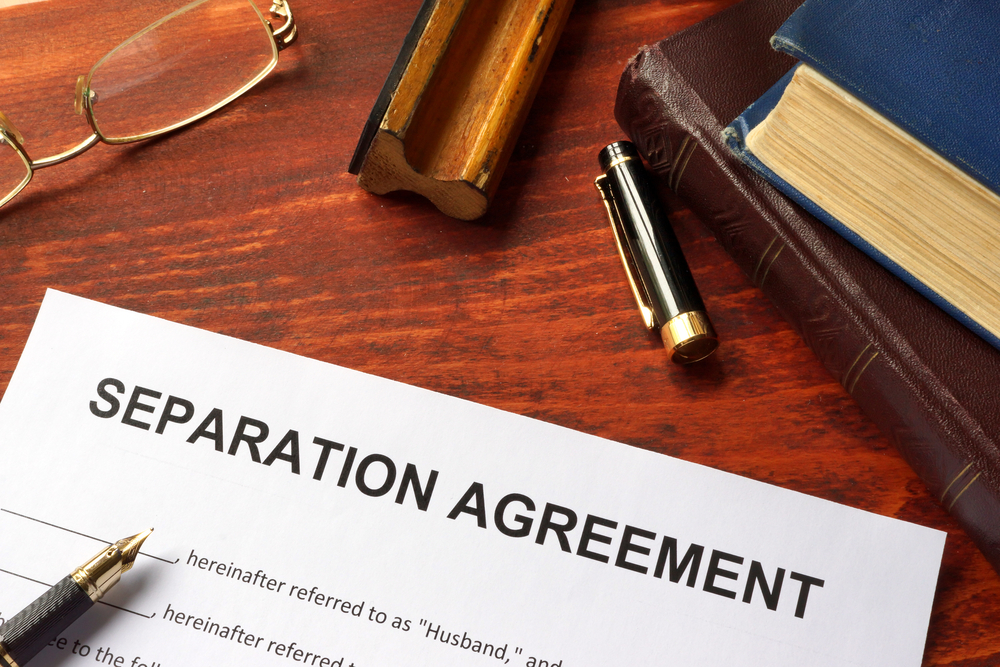Ending a marriage is a deeply personal decision with difficult emotional and financial consequences. To make matters even more complicated, separated spouses must often jump through a number of legal hoops before they even qualify to file for divorce in the Commonwealth of Virginia.
Unless one partner alleges the other is “at fault” for adultery, abandonment, or other behavior that contributed to the breakdown of the marriage, separated partners are required to live separately for a minimum number of months before they can petition for divorce.
If you and your spouse have children together, the two of you must live separately with no cohabitation for a continuous period of twelve months. If you do not have children together, the minimum is a continuous period of six months.
During this mandatory separation period, many ex-partners choose to establish a separation agreement. Separation agreements are formal arrangements that begin the process of addressing issues that need to be resolved before the divorce. This includes things like division of debts and assets, child custody, and financial support.
Advantages of Separation Agreements
In Virginia, there is actually no process in place for obtaining a legal separation. In lieu of a legal separation, couples can form separation agreements, which are essentially voluntary contracts that can be used to settle certain rights and issues, such as the division of assets, spousal support, and child custody.
There are a number of advantages to obtaining a separation agreement, including:
- It can be used as a trial run for a big decision – Divorce is a final solution for marriages that become irreconcilable. A separation can be like a formal trial run that allows couples the time and space to decide whether divorce is the logical next step. If couples do choose to divorce, the separation agreement can be used as grounds for the divorce separation.
- Couples can avoid going to court – Many couples work on resolving issues related to their parting during a separation agreement. If separated spouses can agree on factors like division of assets, custody, and support in advance, they may be able to avoid costly and drawn-out court appearances.
- Divorce may not adhere to religious or cultural principles – Certain religious and cultural traditions discourage divorce or prohibit the practice entirely. When divorce is not an option, a separation agreement can be used as a workaround to allow couples to address their differences.
- Social Security, tax, and insurance benefits – With a separation agreement in place, you are still legally married. This means you may still qualify for certain benefits that are only available to married couples. For example, if you stay married for at least ten years, you could qualify for Social Security benefits on your spouse’s behalf. Married couples may also receive tax benefits from filing jointly and the benefits of family insurance policies.
Limitations of Separation Agreements
On the other hand, it’s important to know that there are limitations to separation agreements. For example:
- Separation agreements are voluntary contracts, not a court order – Securing a “legal separation” is not an option in Virginia. If you and your spouse cannot agree on the terms of your separation agreement, you will not be able to form a separation agreement. In that instance, you may need to wait until your divorce proceedings to settle certain issues.
- You remain legally married during a separation agreement – During a separation period, you are still legally married to your spouse. In Virginia, this means you can’t legally remarry or have sexual relations with a dating partner. If you do, you may be charged with adultery, which could potentially affect your rights to spousal support or division of marital assets. While you may be required to live separate and apart for up to one year, after that requirement is fulfilled, a separation agreement may no longer make sense for you.
How a Virginia Beach Lawyer Can Help
Attorney Mike Deering is an experienced litigator with a passion for helping families resolve complex divorce issues. Mike’s dedication and personalized approach have allowed him to provide clients with professional and compassionate guidance during extremely difficult times.
To discuss the details of your case with a Virginia Beach family law attorney, contact Deering Hedrick to get started with your custom case review. Get in touch with us online or call us at 757-383-6848.








